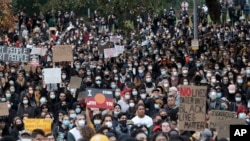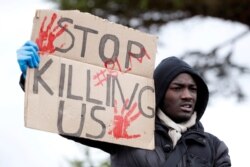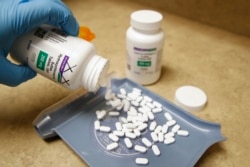Ignoring warnings that mass protests could trigger spikes in COVID-19 cases, tens of thousands of people took to the streets across Australia Saturday in support of the Black Lives Matter movement following the death of an African American man after being restrained by a white policeman.
Demonstrators rallied in large cities such as Sydney and Melbourne and in small towns across the country after a court overturned a ruling Friday declaring the Sydney protest illegal on health grounds.
Marchers carried signs that read “I can’t breathe,” among the last words spoken by American George Floyd on May 25 as a policeman pushed his knee into his neck as he was pinned to the ground while handcuffed.
Another sign displayed “Same story, different soil,” a nod to the institutionalized racism in the country that has led to a large number of deaths of Aboriginal Australians and an inordinately high incarceration rate.
Despite warnings from Britain’s health minister to avoid weekend protests, throngs of defiant mask-wearing people participated Saturday in Black Lives Matter protests in London, Manchester and Leichester.
The threat of the spread of the coronavirus also did not deter protestors against racism and police brutality Saturday in a number of other countries, including Canada, Germany and Zimbabwe.
In other developments, Spain said Friday it would begin reopening its borders to foreign tourists July 1, and Saudi Arabia reimposed a 3 p.m. to 6 a.m. curfew Saturday in the city of Jeddah after a surge in coronavirus cases.
Meanwhile, the World Health Organization (WHO) has changed its advice on face masks, saying they should be worn where COVID-19 is widespread and physical distancing is difficult.
"In light of evolving evidence, WHO advises that governments should encourage the general public to wear masks where there is widespread transmission and physical distancing is difficult," WHO’s Director Tedros Adhanom Ghebreyesus said Friday.
Many major retailers have made face masks mandatory for shoppers in the United States. Many transit systems around the world are requiring masks for their riders.
Speaking to reporters Friday at the White House, President Donald Trump said that the U.S. was "largely through" the pandemic and called again on governors to ease lockdown measures in their states.
The COVID-19 pandemic killed more than 900 people in 24 hours in the United States Friday, according to Baltimore-based Johns Hopkins University (JHU).
Data tracking worldwide by the Center for Systems Science and Engineering (CSSE) at JHU show that the United States has suffered by far the largest number of COVID-19 deaths, with a total of 109,143, about a third of them in New York State.
According to the center, Britain comes in second with 40,344 deaths, followed by Brazil with 34,021 and Italy with 33,774.
The U.S. has also recorded the highest number of COVID-19 infections — 1,897,838. Brazil comes in second with 614,941, Russia with 458,102 and Britain with 284,735.
The global number of deaths stands at 394,875 and total confirmand cases at 6,776,997.
The Group of 20 rich and emerging economies pledged several billions of dollars to fight the COVID-19 pandemic, the group said in a statement Saturday.
"The G-20, with invited countries, has coordinated the global efforts to support the fight against the COVID-19 pandemic. To date, G-20 members and invited countries have pledged over $21 billion to support funding in global health," the statement said adding that the fund will be directed toward diagnostics, vaccines, therapeutics, and research and development.
A new study by researchers at the University of Minnesota say hydroxychloroquine, the treatment that President Trump highly touts as an effective COVID-19 treatment, does not keep healthy people exposed to the virus from getting sick.
The report in The New England Journal of Medicine says the drug was no more effective than a placebo in clinical trials.
The scientists carried out their tests on 800 people exposed to someone with the coronavirus.
Hydroxychloroquine is a drug used to treat malaria, which Trump called a “game-changer” in the fight against COVID-19. He claims to have taken the drug himself.
But some doctors say the drug could have serious side effects, including heart rhythm problems or even death.
The World Health Organization has suspended the use of hydroxychloroquine in tests for a coronavirus treatment. France has outlawed its use altogether.
Wayne Lee, Isabela Cocoli contributed to this report.








